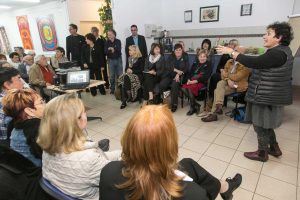Many Shoah survivors live below the poverty line. It is the Claims Conference’s mission to provide them with justice and support in their old age…

A forum with survivors at AMCHA center in Jerusalem
(c) Claims Conference
Leah S. sits at a small wooden table in the living room of her basement flat in Tel Aviv. She continually repeats the words “bread is life” like a mantra. Since her liberation from the concentration camp in Auschwitz, she has always kept at least three loaves of bread in the house. On this sunny February morning, I join Keren, a partner agency of the Claims Conference, during a home visit with the elderly survivor. Leah originally comes from Czechoslovakia and emigrated to Israel via Hungary following her liberation. Her husband, also a survivor of the Shoah, was so deeply affected by what he experienced that he was no longer able to hold down a regular job. Leah worked as a cleaner to keep the family of five afloat. Her family could always rely on her; nowadays, the 94-year-old is no longer able to take care of herself physically or financially. She receives the regular amount of hours of care from the Israeli state health insurance Bituach Leumi, which the Claims Conference supplements with an additional nine hours per week. Leah is by no means an outlier. Almost 40% of the survivors worldwide live below the poverty line in their respective countries
of residence.
Taking action
Over the past few years, the Israeli government has made every effort to improve the situation for survivors in Israel. The hours of care granted by the health insurance funds, however, fall short of the mark in many cases. The additional hours of care borne by the Claims Conference enable a tangible improvement to the care situation. In addition to the funds supplied by the Claims Conference’s successor organization, the German government also provides funds to this end. Yet, in spite of these joint efforts by the state of Israel, Germany, and the Claims Conference, it is far from sufficient when it comes to meeting all of the needs for in-home nursing and medical care among Holocaust survivors.

(c) Claims Conference
Many people are surprised to learn that – more than 70 years after their liberation – there are still approximately 180,000 survivors of the Shoah living in Israel alone. Some immigrated to Israel during, and especially after, the Holocaust. Hence, the Claims Conference’s mission to provide survivors with a small measure of justice is not likely to end any time soon.
The history of reparations and rehabilitation for the victims of National Socialism has been a lengthy battle for historical truths and the alleviation of injustice. The NS era cannot simply be reduced to twelve years of factual dictatorship; this holds particularly true for the history of injustice from which persecutees suffered even after their liberation. There continued to be a number of people who adopted a mentality of shutting their eyes to, or repressing, the injustice. Having said this, there were some who also spoke out against the German “blood money” – especially in Israel. Nevertheless, those who decided to apply for compensation at that time were often subjected to degrading investigation and interrogation procedures.
In light of the large number of survivors, the Claims Conference draws a great deal of its attention to survivors in Israel. In 2017 alone, the Claims Conference paid ongoing compensation pensions to 21,000 survivors in Israel. It also finances projects such as soup kitchens for survivors, funds institutions that are dedicated to providing survivors with material and social services, and renovates and develops facilities in a way that is appropriate for the elderly.
Even traumas can be portrayed as a form of continuity, since they have the ability – to this day – to leave a mark on and represent a burden for survivors of extreme persecution and violence. Especially during old age, when social bridges such as family, friends or everyday working life break away, traumatizing experiences present a burden. Zvi Steinitz, who survived Auschwitz-Birkenau, Buchenwald, and Sachsenhausen, once said, “I was free on the outside, but on the inside, in my soul, did I really feel free?” Today, he lives in Tel Aviv and uses social services from AMCHA, one of our partner organizations in Israel. With some 20,000 people who receive assistance in psychotherapies, social activities, and through home visits, the number of survivors seeking help at AMCHA has doubled over the last ten years.
Throughout the course of negotiations with the Federal Government, the Claims Conference has consistently reported the particularly difficult living conditions of Holocaust survivors and has seen successful results. This is why the funding for home-care support for survivors has been increased time and time again over the past few years. However, the aging group of survivors also has a increasing need for support as they grow older. In 2017, our help in the area of home-care support reached approximately 35,000 survivors of the Shoah in Israel. Today, around one third of all Shoah survivors live in Israel. According to figures from the Israeli bureau of statistics, some 26,000 survivors of the Shoah will still be alive in the year 2035. They, too, must be able to count on our support.
An important issue for survivors in Israel and across the globe is how the world will remember the Holocaust when they are deceased. In the face of rapidly declining societies in Europe, many survivors fear that the history of the Holocaust will be distorted or denied. This is why the Claims Conference’s Holocaust educational and memorial work will play a greater role in the future. ■
Rüdiger Mahlo is the representative of the Claims Conference in Germany
